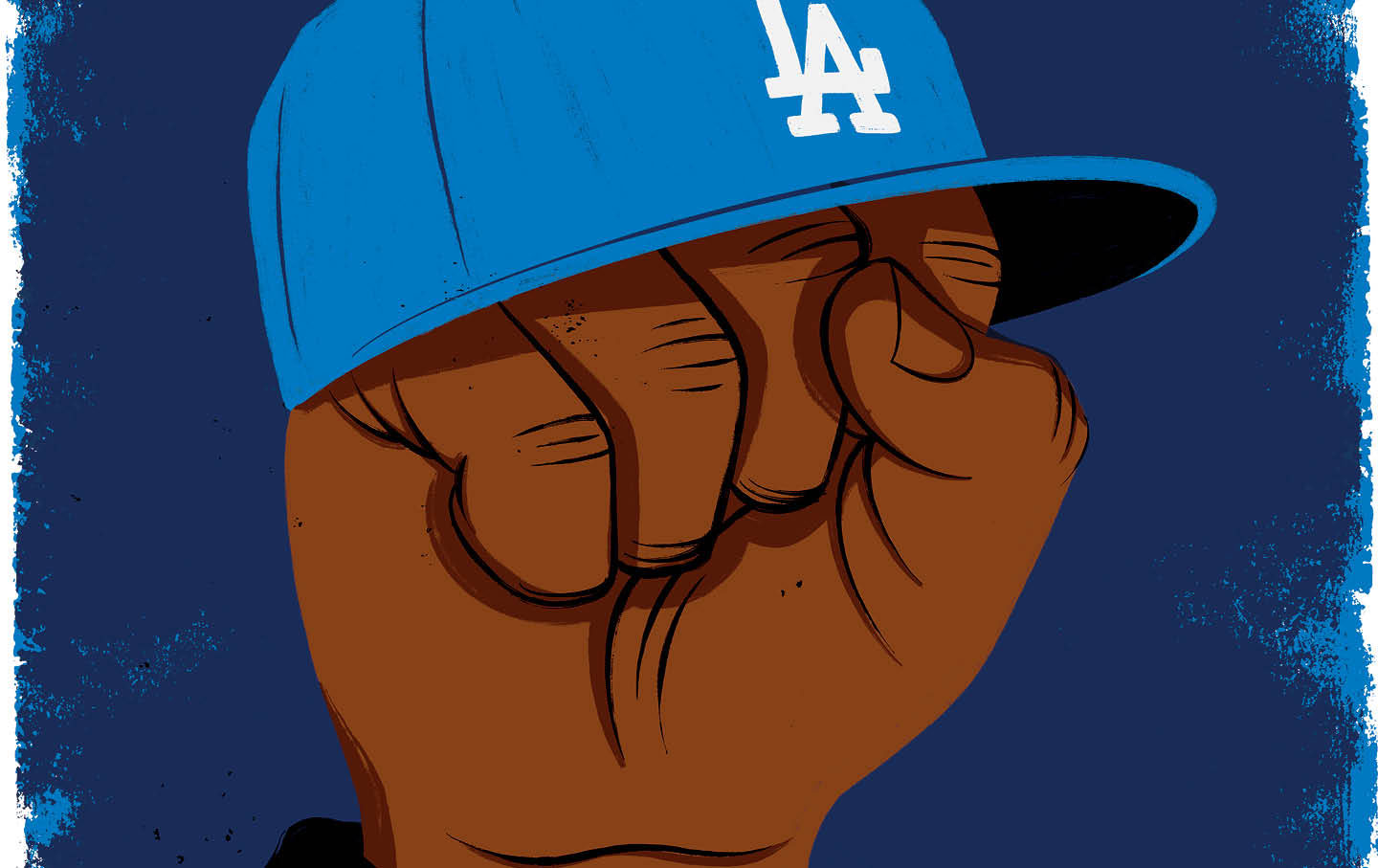The Value of Joy
By canceling Joy Reid’s cable news show, MSNBC has not only silenced a brilliant host: It’s silenced the next Black voice you haven’t yet heard.
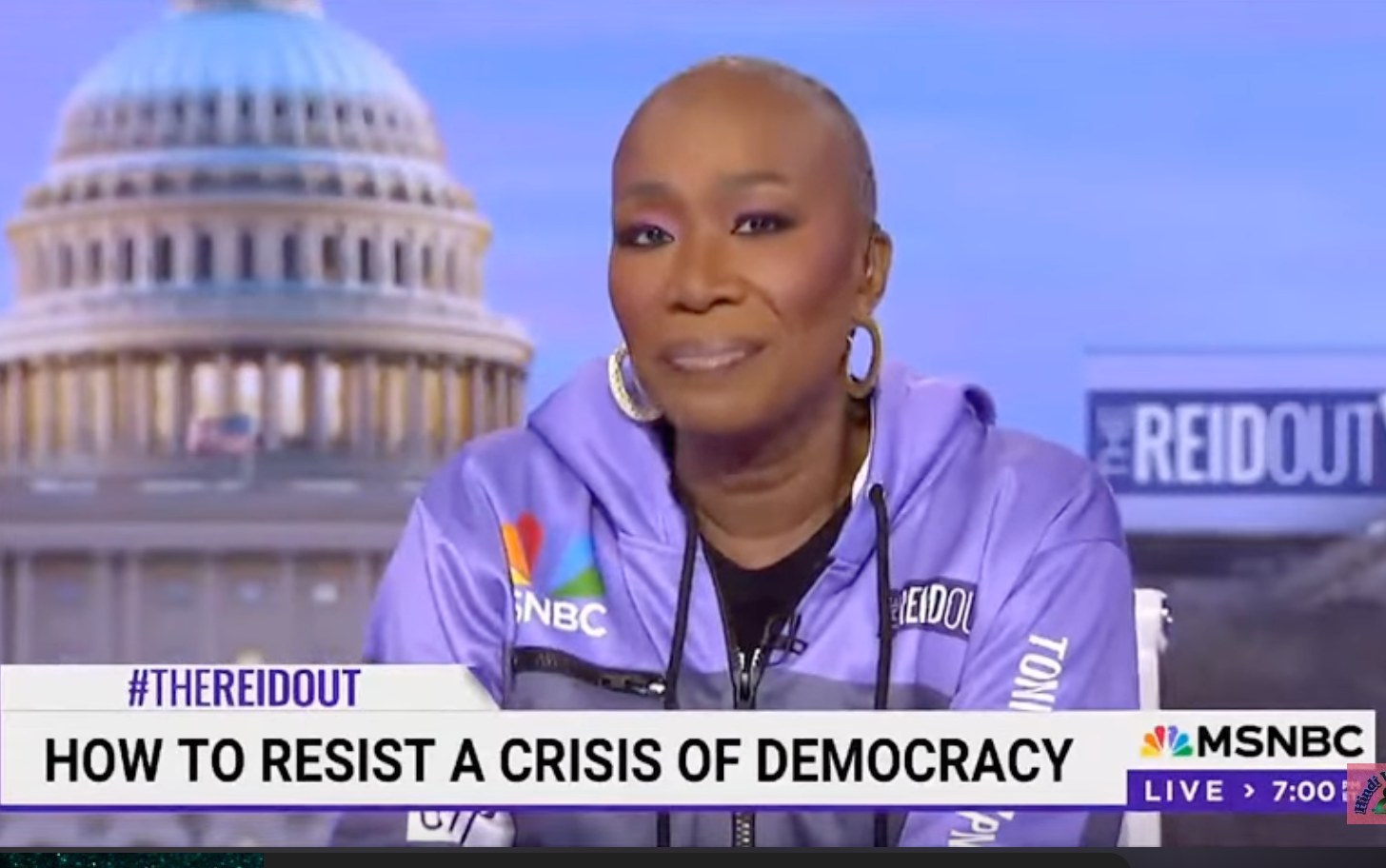
Joy Reid hosts The ReidOut on February 24, 2024.
(Screenshot / MSNBC)
Joy Reid is responsible for my signature afro. It was late 2018; I was in the makeup chair at MSNBC, and the makeup artists said, “You have such nice hair.” My hair was getting pretty long, and I thought she was nicely telling me it was time to get it cut, as older Black women in my life were always telling me whenever I’d let my hair get too long. I assured her that I was going to the barber shop right after my Saturday spot on AM Joy.
Joy was in the chair next to me. She slowly turned to me and said, “Do you like being on television?” I said, “Yes,” and she said, “Then I would keep your beautiful Black hair.” My hair had long gone gray by that point, but she wasn’t talking about its color. She broke it down for me, explained how television was a visual medium, and told me that my afro was a “signal” to viewers that I was bold and unafraid. I countered with how I had been told to keep my hair “high and tight” (around white folks) for fear of their dismissing what I had to say because they were unused to seeing natural Black hair. She told me to pay those types of people no nevermind, and added: “Not everybody could pull it off, but you can. Your hair matches what you say.”
I never did go to the barber after the show. My mother is still pissed about it.
I’ve told that story to a lot of people and, for many white people, it’s just a cool “behind the scenes” story about how television gets made. Black folks, for the most part, understand that our little conversation was much deeper. I was essentially making “respectability Black” arguments: accepting the premise that to succeed in a white world, I had to look like they wanted me to look. Joy was telling me to not play their game, to be my full authentic self on television, and trust that viewers, especially Black viewers, would have my back. They did.
Over the weekend, MSNBC canceled Joy’s primetime show, The ReidOut. The network followed up by canceling Ayman Mohyeldin’s show, Jonathan Capehart’s show, Katie Phang’s show, and announced that Alex Wagner will not be returning to the 9 pm weeknight slot when Rachel Maddow leaves it again in April. The white hosts at the network remain, as of now, unaffected. What’s happening over there is not subtle.
Cable news has never been truly comfortable with authentic Black voices. That’s true of every type of media, and every medium, owned and operated by white folks, but cable is particularly difficult for Black people to break into because you need practice at it before you get any good. It’s not easy or natural to answer complicated questions in 35-second sound bites while somebody is screaming “WRAP IT UP!” in your ear. It’s harder still when you’re trying to figure out if you’re allowed to give the truthful answer to the question, or only the white answer to the question. God forbid you’re trying to parse all that while making a joke or adding some flair to your answer, or while saying something different, something more unconventional than what was just said by the guest before you or will be said by the guest coming up after. And it’s intimidating when you’re doing it all live and know that anything you say can and will be used against you by Tucker Carlson.
You need practice to get it right, but there just aren’t a lot of cable hours to go around. I’m a writer and I was able to spend 10,000 hours just practicing writing before anybody really started paying attention to what I wrote. If you do radio, there is always some random W-LOL station in Podunk that will have you on and let you practice that format. If you do comedy, there is always a club that will let you grab an open mic at 2 am. If you do YouTube, you can put up videos every day until you figure it out. But when it comes to TV, not so much: You’ll get four and a half minutes here, nine minutes as part of a five-person panel there, and very few opportunities to hone the craft of it all before everybody decides a white guy with better “rapport” with the host should get the seat at the table.
Joy was a singular presence in cable news because she gave young Black people practice. She let us put in our reps. Joy would go out of her way to find young Black talent and put them on her show; then, she put them in situations where they were treated like white talent. What that means is that she wouldn’t just find Black people to talk about “Black” issues; she’d find Black people and let them talk about any issue for which they had expertise. For me, that meant allowing me to talk about the law—and not just “Black” law. I had been on TV quite a bit before I met Joy, pretty much anytime a young Black person was murdered by the cops. That was my television “beat.” Joy was the first person to have me on to just talk about the Department of Justice or the Supreme Court. She let me practice doing on television what I had already been doing on the page for years.
In the process, Joy essentially turned her show into a PhD program for Black journalists, scholars, and experts looking to make the jump to TV. Her show was a showroom for any other television program willing to have interesting Black people on. Former Nation writer Chris Hayes is the first person who put me on primetime television, but his people knew I was ready for it because they’d seen me on Joy’s weekend show. When Joy finally got a primetime gig, she continued her tradition of giving Black folks reps under the bright lights.
It’s a tradition she didn’t start. Joy took the baton handed down by Melissa Harris-Perry after MSNBC refused to let her stay on the air. When Joy left the weekends, she tried to pass that baton to Tiffany Cross, who did everything she could to elevate Black and brown voices and perspectives—before MSNBC fired her too.
You’ll note that all three of these people happen to be Black women. You’ll note that all three of these Black women, while under intense pressure and scrutiny not just from the white-supremacist forces that now run this country but also from their own bosses, still gave opportunities to young, untested nonwhite voices. The safest thing for a person in Joy’s position to do would have been to bring on Jonathan Turley or Adam Liptack or Larry Tribe to talk about the Supreme Court. That would have been the unassailable choice and, even if the segment had been a dud, nobody would have criticized her for putting those guys on. Instead, she brought me on, the “loud” Black guy with “crazy” hair. If I had bombed, everybody would have yelled at her, not me, for having me on. The strength it takes to hold the door open for others even while people are trying to shut you out of the room is the strength of Black women in this country.
White executives never seem to think about that when they’re firing Black women. They tend to treat Black folks as interchangeable, and seem to believe that any old Black person reading the teleprompter counts as “a Black voice.” But we’re not all built the same. To put it plainly, I could not do what Joy Reid has done. You could give me her show, her time slot, and all her producers and researchers (don’t worry, they’re not), and I would fail to recreate the power of her journalism (never forget, Joy was a fantastic reporter first, a talk-show host second), or at mentoring the next generation of people like me. I couldn’t carpetbag her deep roots in the community, wouldn’t leave enough space for others to find their footing, and don’t have her eye for talent. Even if I could hold her audience (using skills she taught me), I could never hold her impact.
Popular
“swipe left below to view more authors”Swipe →Joy Reid is not interchangeable—she’s indispensable, and having dispensed with her, cable television news is left with a gaping hole. That hole is not “Black voices”—that hole is “equal opportunity.” The next iteration of Black talent will have to be like Athena, and emerge, fully formed and wise, out of Zeus’s head. The Black mentor class is being fired, not just on television but throughout America. White folks will still get all the training and opportunities they need, but Black folks will have to figure it out for themselves. Nobody will be around for us. Nobody will be around to give our next generation an opportunity to “earn” it—or the practice it takes to get good.
That, of course, is the point. That’s why people like Joy are being cast aside. White viewers might think that the cable network just went after her, because she is Black and outspoken. Joy has always understood that her show was about everybody else.
Disobey authoritarians, support The Nation
Over the past year you’ve read Nation writers like Elie Mystal, Kaveh Akbar, John Nichols, Joan Walsh, Bryce Covert, Dave Zirin, Jeet Heer, Michael T. Klare, Katha Pollitt, Amy Littlefield, Gregg Gonsalves, and Sasha Abramsky take on the Trump family’s corruption, set the record straight about Robert F. Kennedy Jr.’s catastrophic Make America Healthy Again movement, survey the fallout and human cost of the DOGE wrecking ball, anticipate the Supreme Court’s dangerous antidemocratic rulings, and amplify successful tactics of resistance on the streets and in Congress.
We publish these stories because when members of our communities are being abducted, household debt is climbing, and AI data centers are causing water and electricity shortages, we have a duty as journalists to do all we can to inform the public.
In 2026, our aim is to do more than ever before—but we need your support to make that happen.
Through December 31, a generous donor will match all donations up to $75,000. That means that your contribution will be doubled, dollar for dollar. If we hit the full match, we’ll be starting 2026 with $150,000 to invest in the stories that impact real people’s lives—the kinds of stories that billionaire-owned, corporate-backed outlets aren’t covering.
With your support, our team will publish major stories that the president and his allies won’t want you to read. We’ll cover the emerging military-tech industrial complex and matters of war, peace, and surveillance, as well as the affordability crisis, hunger, housing, healthcare, the environment, attacks on reproductive rights, and much more. At the same time, we’ll imagine alternatives to Trumpian rule and uplift efforts to create a better world, here and now.
While your gift has twice the impact, I’m asking you to support The Nation with a donation today. You’ll empower the journalists, editors, and fact-checkers best equipped to hold this authoritarian administration to account.
I hope you won’t miss this moment—donate to The Nation today.
Onward,
Katrina vanden Heuvel
Editor and publisher, The Nation
More from The Nation
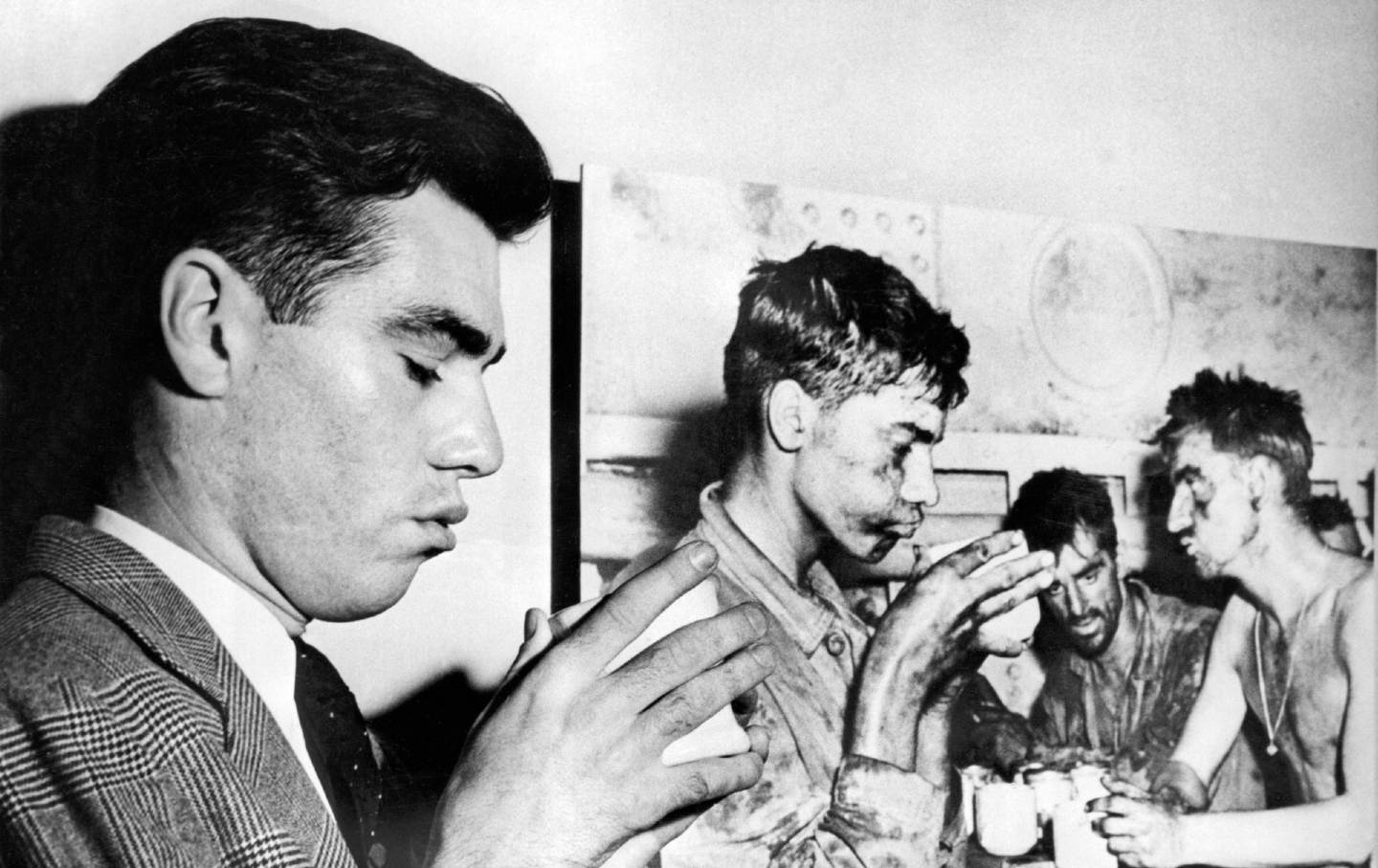
David Nasaw’s Unsparing Tour of America’s World War II and Its Aftermath David Nasaw’s Unsparing Tour of America’s World War II and Its Aftermath
A gimlet-eyed and honest accounting of the war’s hidden costs that still affect us today.
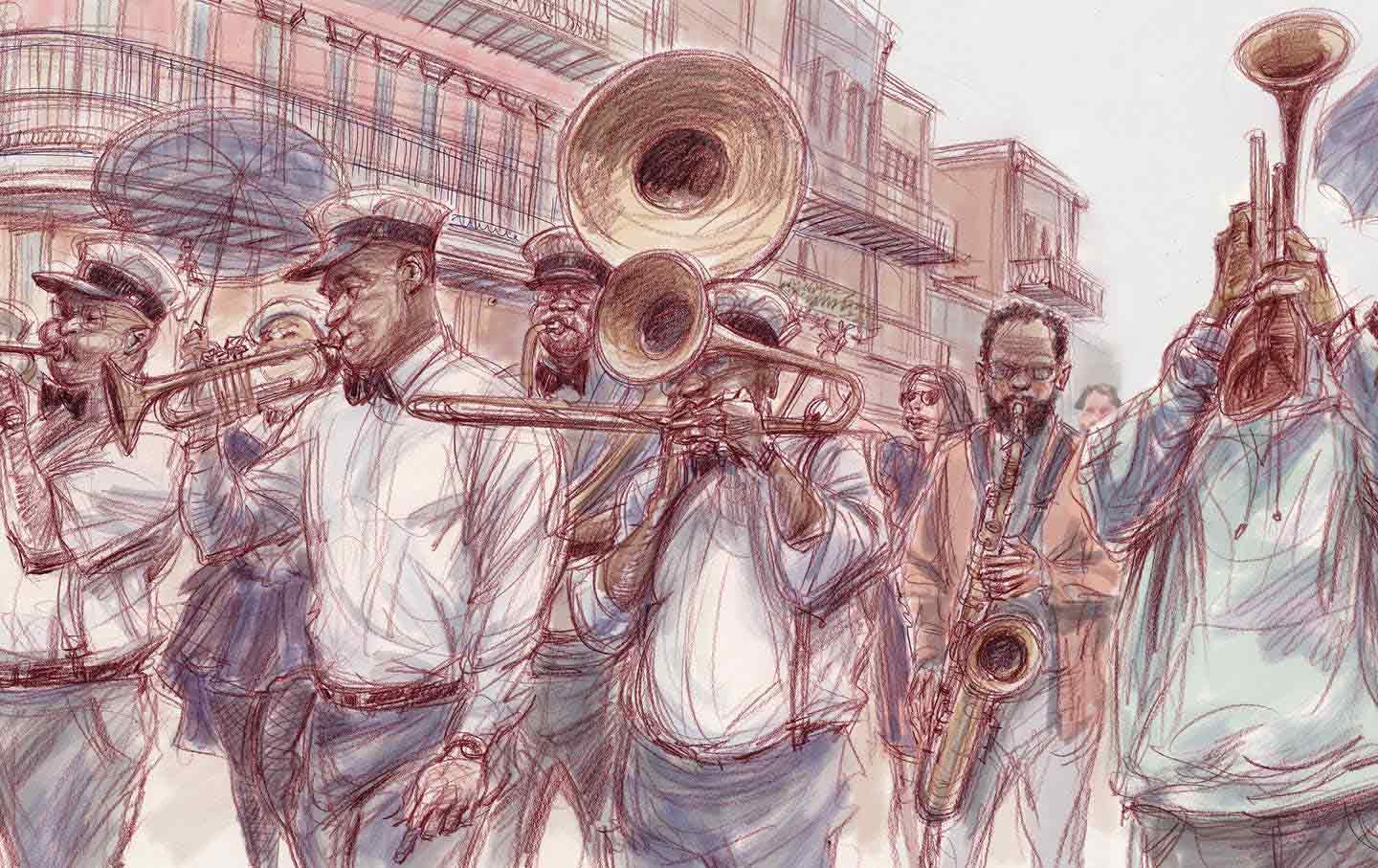
The Fight to Keep New Orleans From Becoming “Everywhere Else” The Fight to Keep New Orleans From Becoming “Everywhere Else”
Twenty years after Katrina, the cultural workers who kept New Orleans alive are demanding not to be pushed aside.

Breaking the LAPD’s Choke Hold Breaking the LAPD’s Choke Hold
How the late-20th-century battles over race and policing in Los Angeles foreshadowed the Trump era.

Mayor of LA to America: “Beware!” Mayor of LA to America: “Beware!”
Trump has made Los Angeles a testing ground for military intervention on our streets. Mayor Karen Bass says her city has become an example for how to fight back.
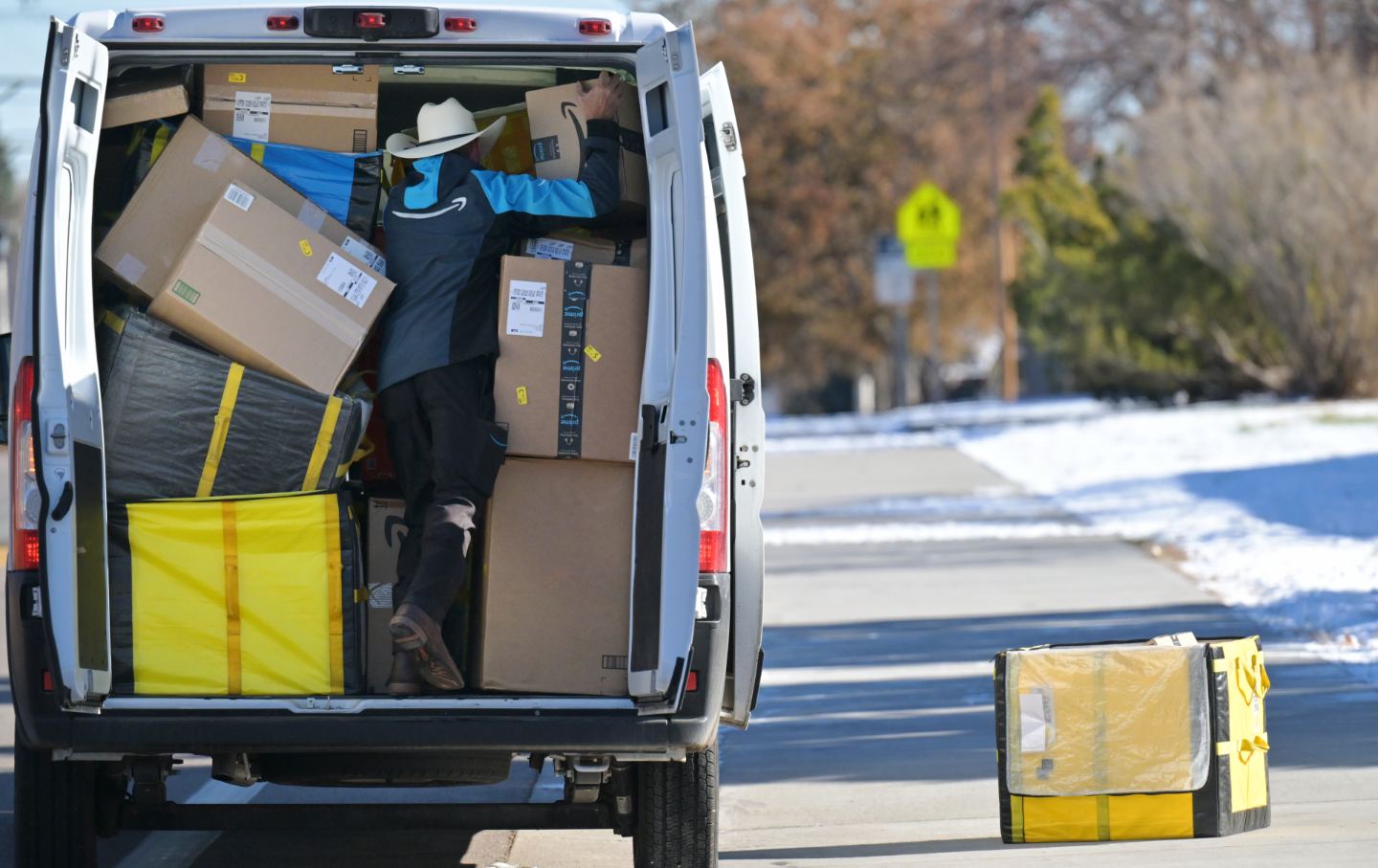
The EEOC Is Now Letting Workplace Discrimination Stand The EEOC Is Now Letting Workplace Discrimination Stand
The agency is unlawfully giving up on fighting disparate impact discrimination—meaning it’s “open season” on employees.
